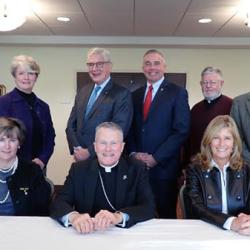The BBC released a report this last week, detailing the rise of anti-Semitism in Europe, and a number of other news outlets offered coverage as well, including The Huffington Postand The Guardian. The survey was based upon the perceptions of 6,000 European Jews, who reported that anti-Semitism is on the rise across the continent and, on that basis some have dismissed the results as far too subjective.
But the numbers and breadth of distribution are difficult to dismiss and articles based on other observations suggest that the trend is hardly a matter of misperception or a matter of confusing anti-Israeli sentiment with anti-Semitism. Indeed, the reassurances offered by one journalist that this is the case and that French Jews are "on the whole respected, professionally successful, socially assimilated and well represented in politics" sounds like something that might have been said about German Jews in 1939. So, such observations are small consolation. Would the same thing be said in respectable news magazines here in the United States as a sop to those who suffer at the hands of racists?
So, what are we to conclude, even if we are a long way from the horrors of Kristallnacht?
One: Plainly the social and democratic vision of a political paradise is a fantasy. Whatever the political commitments of those at the heart of this shameful prejudice (and evidence suggests those commitments vary), it has flourished in cultures that have argued explicitly and implicitly that they can usher in heaven on earth. Nothing evidently—not even a world war, the deaths of millions, and the humiliation of being named and tried as butchers—is enough to erase the possibility of cruelty from the human heart.
We should work for social transformation. We have no choice. Jews and Christians alike profess that God is active in history. But God's activity in history does not exhaust the work of spiritual transformation. The work of God is also nurtured and defended in the hearts and minds of each human being.
Two: The truth, its preservation, and its defense are essential to the work of justice. We have played fast and loose with history. We have allowed countless "readings" and "contextualizations" of history to substitute for the brute facts of historical experience.
To be sure, there is no such thing as history told without interpretation, but when we allow that complexity to privilege readings of history that amount to nothing less than the brute denial or re-construal of the truth (as with Holocaust-deniers), we imperil not just the safety of those whose genocide is a fact, but the well-being and moral bearings of our entire race.
Three: True tolerance is not predicated upon dismissing, sublimating, or explaining away differences—let alone "assimilating" a religion, race, or ethnicity. Genuine tolerance and mutual respect is predicated upon the acknowledgement of differences of every kind. Perhaps one of the stunning and unsettling discoveries that we will make on the other side of this place and time is that God sought to teach us how to believe and live passionately, all the while loving the one who is different from us.
Finally: Christians cannot and must not tolerate expressions of anti-Semitism or the mistreatment of our Jewish brothers and sisters. Nor can we accept any reasoning that might minimize the significance of that behavior as humorless or alarmist. Such behavior is no less egregious than white-on-black racism, or the infringement of gay and lesbian rights. And the line between such behavior and the violence of genocide was, I am sure, as imperceptible in 1939 as it always is, moving not because some visible threshold is crossed, but because too many people have been silent for too long.
12/2/2022 9:10:37 PM





